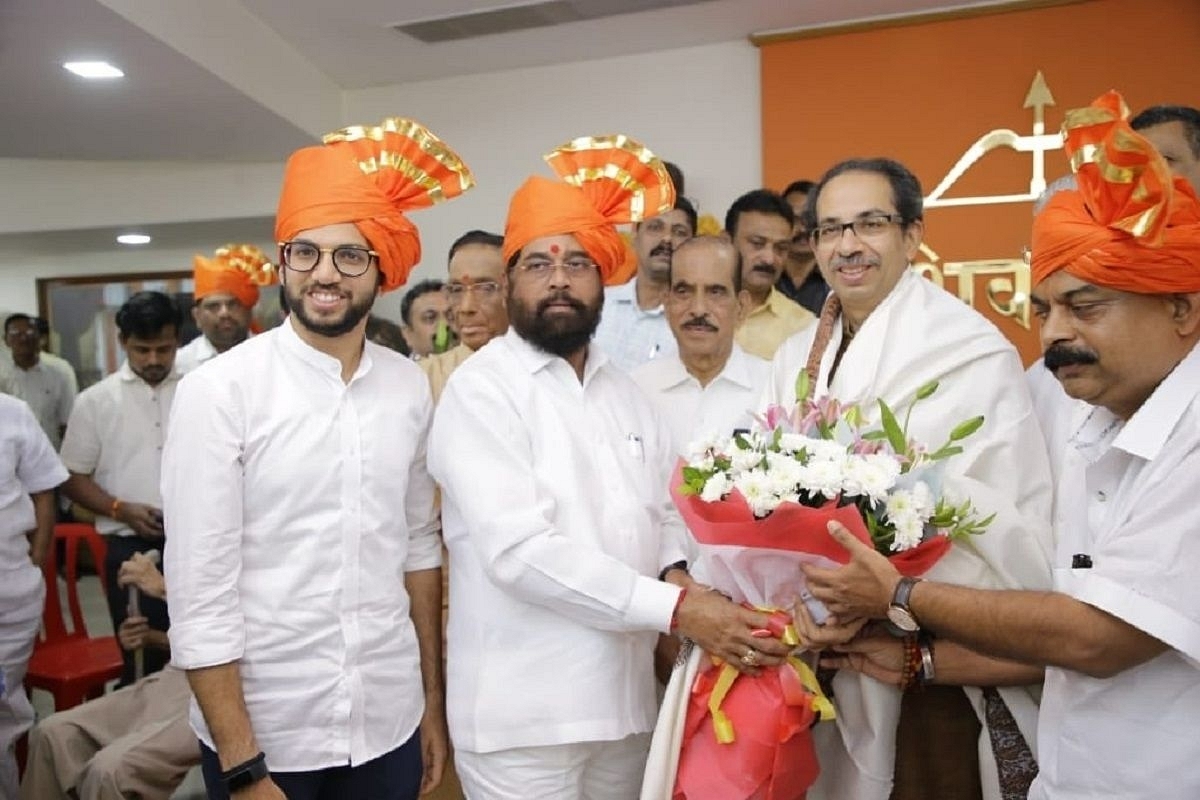Politics
Uddhav Sena Vs Shinde Sena: Why More Factional Feuding Isn't In BJP's Interests
- Only a united Sena will be a useful partner to the BJP in the long run.

Uddhav Thackeray and Eknath Shinde. (Representative image)
The split in the Shiv Sena, where the two factions, one headed by Bal Thackeray’s son Uddhav and the other by Thane strongman Eknath Shinde, is unlikely to be resolved at the level of the Election Commission or even the Supreme Court.
No matter who wins the party symbol or its assets, the divide will have far-reaching consequences not only for the state, but the country too.
It will ultimately be settled in favour of the faction that wins the biggest chunk of the Sena vote base, with the other slowly shrinking.
It is a fundamental law of Indian politics that when a party splits, only one faction will ultimately survive.
From my own interactions with a few ordinary folks in the Sena, I get the feeling that the cadre has stronger emotional ties to the Thackeray scion, for he was the anointed heir to Balasaheb.
The bulk of the party’s MLAs are with Shinde, but this does not ultimately mean much if the voter does not warm up to them.
At the first sign of any consolidation in favour of Uddhav — which is by no means certain — these MLAs will run for cover. The recent show of strength at the two Senas' separate Dussehra rallies shows that Uddhav may be marginally ahead of the Shinde Sena.
The cadre surely was unhappy with the Sena’s compromises on Hindutva in tying up with the Congress and the Nationalist Congress Party to form the Maharashtra Vikas Aghadi.
But they are even more worried about the split and the blood-letting that it will involve, which could result in the party’s overall marginalisation.
My hunch is that, at a crunch, they will go for Uddhav, not Shinde, for the latter has not exactly shown an ability to excite the cadres.
The Bharatiya Janata Party (BJP) should be even more worried, even though it is currently sharing power with the Shinde Sena.
Devendra Fadnavis is the power behind the throne, but if Shinde’s throne itself is shaky, he too will lose traction.
There are three reasons why the BJP should be thinking two steps ahead of its current hold on power.
One, the split in the Sena, and any future consolidation in favour of one of the factions, is not a good thing for its own future, for it will make any reconciliation with the Uddhav Sena impossible.
Even if it loses the first election, it will become shriller and more troublesome after that.
Two, what happens to a Hindutva coalition in Maharashtra will impact the BJP’s plans of emerging as the natural party of governance at the Centre.
Three, and most important, the BJP has to decide what its own priorities are, and how strong its commitment to Hindutva, or the protection of Indian interests at home and abroad, is.
It cannot talk about Hindutva only when it seeks power, and then abandon it whenever it needs a non-Hindutva ally.
The BJP has a future only as a guardian of Hindu interests.
Secularism and minority wooing will undermine its core ideology, and ultimately loosen its hold on power.
Secularism will make it difficult to protect Hindu interests at a time when these are under collective attack both at home and abroad.
An outreach to unite the two Senas in favour of a broader coalition to protect its Hindutva agenda is thus more important than trying to run a government that shows no signs of being confident enough to run for the remainder of the term of this assembly.
If the BJP manages to get a new deal with a united Sena, it will send a strong message to all allies, present and future, that it can sacrifice some of its own interests, when needed.
This will be useful not only for retaining power if it falls short of 272 in the 2024 general elections, but also to protect its core Hindutva strategy.
Here's the reality: most of the strong regional parties, barring the communists and the Dravida Munnetra Kazhagam, are essentially Hindutva parties that are forced to pose as secular parties in order to grab the Muslim or Christian vote.
It is in the BJP’s long-term interests, and especially its Hindutva agenda, to reduce their dependence on the minority vote, which makes the defence of Hindu interests even in India next to impossible.
The only reason for the BJP to exist is bring all Hindu-based parties under one banner, so that the ruinous courting of the rabid Islamist vote can be avoided.
When Hindu parties are in power, the minorities can be given a good deal from a position of strength.
The future of Hindutva depends on the BJP playing this role of uniting all caste-based parties to pull together to defend common Hindu interests. It will also ensure the BJP’s longevity outside the Hindi belt.
A start must be made by making up with the Sena by seeking a compromise solution where the Uddhav Sena is assured a future, and the faction now allied with the BJP can quietly move back to a unified Sena.
Only a united Sena will be a useful partner to the BJP in the long run.
Introducing ElectionsHQ + 50 Ground Reports Project
The 2024 elections might seem easy to guess, but there are some important questions that shouldn't be missed.
Do freebies still sway voters? Do people prioritise infrastructure when voting? How will Punjab vote?
The answers to these questions provide great insights into where we, as a country, are headed in the years to come.
Swarajya is starting a project with an aim to do 50 solid ground stories and a smart commentary service on WhatsApp, a one-of-a-kind. We'd love your support during this election season.
Click below to contribute.
Latest